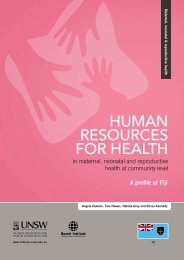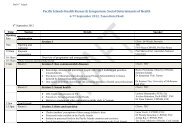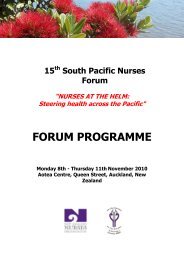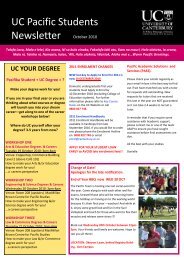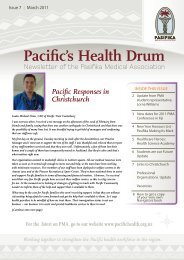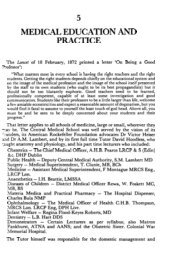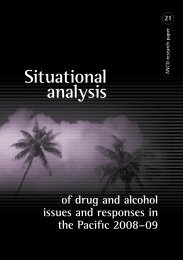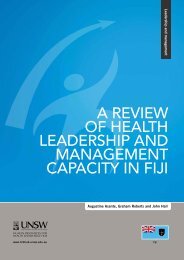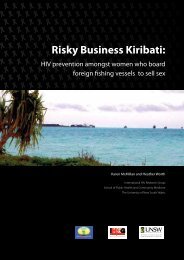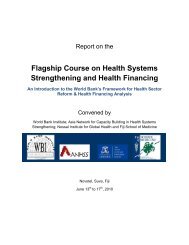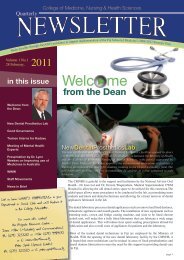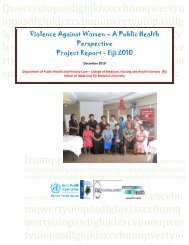rp21 situational analysis - Pacific Health Voices
rp21 situational analysis - Pacific Health Voices
rp21 situational analysis - Pacific Health Voices
You also want an ePaper? Increase the reach of your titles
YUMPU automatically turns print PDFs into web optimized ePapers that Google loves.
Law enforcement<br />
The National Narcotics Control Board Act<br />
1992 established the National Narcotics<br />
Control Bureau; it is responsible for coordination<br />
of all aspects of the response against<br />
drugs. 604 Overwhelmingly, the response to<br />
illicit drug use in PNG is punitive, focused<br />
on supply and demand reduction. Provinciallevel<br />
bans and eradication schemes dominate<br />
the response. Examples include a September<br />
2008 protest march against drug and<br />
homebrew dealers by up to 10 000 people<br />
in Kundiawa, Chimbu province. The march,<br />
endorsed by the provincial police commander,<br />
included schoolchildren, public servants,<br />
hospital patients, police, correction officers<br />
and prisoners, women and youth equipped<br />
with placards motivated by the view that the<br />
removal of marijuana and homebrew from<br />
the community would help to end law and<br />
order problems. Identified problems included<br />
rape, stealing, murder and the rise of HIV<br />
and AIDS. 605<br />
Other provincial-level interventions have<br />
included a PNG Telikom initiative in 2001<br />
which provided for the installation of telephone<br />
lines with six extensions free of charge,<br />
manned 24 hours a day at the Boroko police<br />
station, for the public to call the police and<br />
pass on any information that may lead to the<br />
arrest of drug offenders. 606 The program was<br />
launched on the International Day against<br />
Drug Abuse and Illicit Trafficking and was<br />
part of the increased concern about the rise<br />
in marijuana cultivation, trafficking and<br />
consumption.<br />
Reports suggest that PNG has continued to<br />
struggle in responding to narcotics cultivation<br />
and trafficking despite formation of<br />
the Bureau, with former staff continuing to<br />
receive substantial salaries, and other ‘shady<br />
payments’, reports of want of financial probity<br />
and drugs for guns deals, to name but<br />
a few issues. 607 Calls for independence and<br />
change in staff have been made, with proposed<br />
staffing to include young women,<br />
doctors, lawyers, teachers and church representatives.<br />
Reports in 2004 noted problems<br />
with Viagra, cannabis, ecstasy and cocaine,<br />
in addition to problems of drug trafficking,<br />
human smuggling, money laundering and<br />
the sale of illicit drugs. There have been more<br />
than 13 police commissioners since independence,<br />
equalling one police commissioner<br />
125<br />
604 National Narcotics Control Bureau: (last updated<br />
May 2006).<br />
605 10 000 In PNG march against drugs, homebrew. Papua New Guinea Post-Courier, 29 September<br />
2008. Available at: (accessed<br />
June 2009).<br />
606 Alison Anis (2001), PNG Telikom to install free police lines in campaign against drugs, The<br />
Independent, 31 May 2001. Available at: .<br />
607 Narcotics Bureau mired in corruption, The National, 8 November 2004. Available at:<br />
(accessed January<br />
2009); for background on drug control in PNG, see also H. Ivarature (c.1997), Drugs, Arms and<br />
National Security: the global becomes local in Papua New Guinea. Research report: Militarisation,<br />
Economic Penetration and Human Rights in the <strong>Pacific</strong> series. Uppsala, Sweden: Life & Peace<br />
Institute. Available at: .<br />
Papua New Guinea



